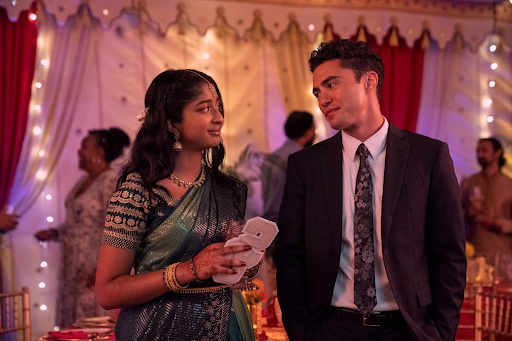
There’s one thing for sure: I’ve never both loathed and empathized with a character more than I have Devi Vishwakumar. In the fragrance of her mother’s kitchen, the looming dream of Princeton, and the wake of her father’s death, Devi’s decisions are, well, questionable in her senior year. In the Mindy-Kaling-directed, four-year series Never Have I Ever, we wave our Indian-American protagonist a final goodbye in the show’s last season. It’s remarkably relatable, yet criticism remains in how it represents South Asians, breaking preconceived stereotypes, while simultaneously creating harmful ones.
As a Tamil-American high schooler, the way Devi (Maitreyi Ramakrishnan) walks the tightrope of her dual cultural identities is all too familiar. She’s the daughter of the Indian diaspora, at once labeled “too Indian” and “not Indian enough.” Devi, however, still falls into Mindy Kaling’s pattern of self-inserted female Indian protagonists — the archetypal insecure, brash, and boy-crazy girl. This isn’t to say Kaling hasn’t spearheaded Indian-American representation, but by overturning the docile, submissive stereotype of these women, she may be propagating new ones.
Asian women are often typecast as obedient, though Devi’s character isn’t voiceless in the slightest — yelling expletives in public, accosting her Princeton interviewer, and spreading lies like wildfire. But in her seasons-spanning romance with rival-turned-lover Ben Gross (Jared Lewinson), that characteristic boldness thins out. He’s ignored her, thrown racially motivated nicknames at her friend group, but suddenly supportive of her while she’s amid college rejections. I was craving some character development, for Devi and for Ben, while all I got was a girl who’s outspoken in all the wrong places. The writing doesn’t serve her right.
In this finale’s sour aftertaste, the tinges of beauty I found left were in Never Have I Ever’s portrayal of generational grieving. The dynamic between Devi and Dr. Ryan (Niecy Nash), her therapist, displays a nonlinear grief, when healing feels like a disregard for the lost. It’s incredibly well-done — even in Devi’s gutted childhood bedroom, a sentimental memory of her late father Mohan (Sendhil Ramamurthy) clings onto the walls. She’s packing up for a new life, grappling with being not just a victim of grief, but a survivor. Perhaps what Never Have I Ever does best is not the boys Devi chases, but how, even in haphazard writing, it makes complex emotions seem dazzlingly clear.
I loved Devi because I could relate to her — we’ve all made bad decisions. And Never Have I Ever gave Indian representation that seemed fresh. Devi, throughout the show, was in grief, anger, she was Indian, American, she was so authentic. I can only hope to see more of it, but with a girl our youth can look up to while also feeling seen.
